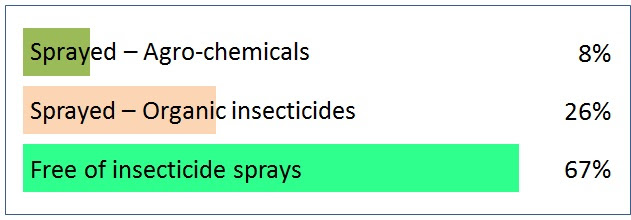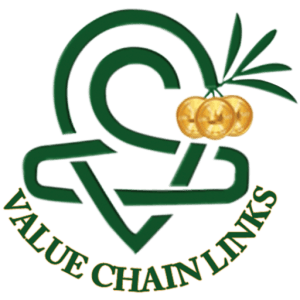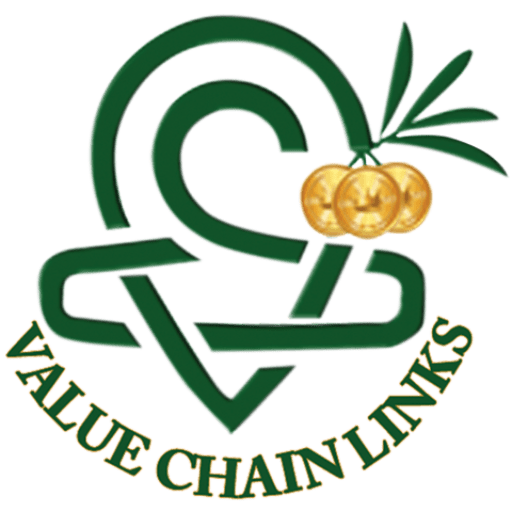THE SECRET TO MARKETING FRESH MANGOES THAT WILL TRIPLE YOUR PROFIT AND MAKE YOUR COMPETITORS NON-RELEVANT

By Dr. nimrod

A NECESSARY DETOUR
It was 1994, and I just completed a Bachelor degree in plant protection, when it became clear to me that the best fruit category would be “none sprayed," or at least far lesser sprays.
But there was a problem – the back-bone of crop protection was (and still is!) pesticide sprays, and there was no effective crop protection technology to replace sprays.
For a NON-SPRAYED category, we need a way to control the main pest/s without sprays.
My vision and hopes for a better future for farmers, consumers, and the environment are useless without an effective alternative for pesticides and a live demonstration to present its feasibility.
No one would come to my help and give me the technology and knowledge I needed so badly.
It was clear to me that if I want to realize my vision, I would also need to take full responsibility for creating a Package of 'tools', knowledge, and services to enable it.
I made a detour in my carrier - the stages I envisioned were as followed;
Starting by developing a zero-spray technology that would replace insecticide sprays. Continuing by demonstrating its effectiveness under field conditions. Finally, I hoped to be lucky enough (which I had great doubts about), to start marketing labeled produce under a new category of - free of insecticide sprays.
I got to work, with the next steps being to apply the above plan.
It was 1991 when I began my plant protection studies at the university. After graduation in 1994, I continued to research and completed my Ph.D. in 2004.
I became a world expert in the field of fruit fly meta-population ecology. Thus, based on a higher level of understanding insects' ecology, rather than poisons' chemistry, I was creating and bringing the knowledge required for future crop protection..
Now I had to complete the development of the technology, which I already started developing.
In 2004, as I said my farewell to the academic lives, I founded Biofeed to develop a highly effective non-spraying technology for fruit fly management. I wanted it to be good enough so that conventional farmers would use it instead of sprays.
I started developing that zero-spray technology, not because I thought it is easy, but because it was needed, and if I wouldn't do it, no one else would.
I thought it would be a good idea to focus Biofeed’s R&D on fruit fly management. Why? Because fruit flies are accepted as the most challenging group of pests and often account for 50% to 100% of pesticide applications. One may say, “if you can control fruit flies without sprays, you can control anything.”
I was glad to see the accomplishment of the detour with complete success; Biofeed has developed a series of fruit fly solutions, introducing unprecedented results [>><<].
We conducted extensive field trials in regions where fruit flies have no solution, and fruit infestation is higher than 50%, i.e., Africa and Asia.
We were hoping to reduce infestation by 50%. Nevertheless, by combining the innovative FreeDome technology as an integral part of the methodology and concept of the Fruit Fly Certified Trade Zone (FFCTZ) protocol, we managed to reduce fruit fly infestation by a staggering nearly impossible rate of - 99%, versus sprays or any other best practice.
Finally, today, under FFCTZ protocol, fruit flies are no longer a problem, and exporters/importers can safely trade with high value produce worldwide.
“HOME RUN”
Now that we got over the technological and knowledge impediments to produce fruits free of (or much less) insecticide sprays, it was time to focus on the main topic on our agenda.
Finally, the No Insecticide Sprays Fruit Category became possible, and we named it Green Valley. We set mangoes, a high-value fruit, and the most common around Africa and Asia, to be the first product we launch under the Green Valley brand.
Green Valley is the brand and operation arm for taking the technology and knowledge created by Biofeed and uses it to bring to life the vision of improved livelihood to farmers, growing crops free of sprays, for healthier consumers and environment.
REALITY CHECK
During the last four years, Green Valley demonstrated its ability to enable farmers to produce Export Quality mangoes across Africa and India (i.e., Asia). Yes, when working under Green Valley protocol, export quality is possible regardless of place, size of the farm, variety, climate (rainy or dry), and even when adjacent farms suffer over 50% fruit fly infestation.
After years of hard work on developing and tuning the technology and protocols to obtain consistent quality results, it was time to re-focus toward our end buyers – the consumers.
Fortunately, I found it to be easier than expected. You see, during the past four years, through thousands of posts and articles, I kept updating my Followers on the social platforms (over 30,000) about what I am doing, my thoughts, trials, challenges, breakthroughs, and of course, about the amazing field results.
As soon as my Followers noted the great field results and the opportunity of getting Tastier Mangoes, Free of Sprays, I started getting requests to bring these fruits to Europe. People started asking when it will be available in their city.
I decided to use the social platforms, in particular the LinkedIn survey tools, benefiting from the crowd wisdom, to ask the people for their opinion and get better clarity on the WHY of our target consumers.
Note, LinkedIn surveys do not apply to strict scientific demand and hence should be handled with care. Surveys were released gradually, 1 to 6 weeks apart, with the respondents remaining anonymous.

We started by asking people; Are you satisfied with the Taste and the general quality of mangoes in the EU and the USA?
Most respondents (71%) stated they are NOT satisfied with the Taste and general quality of mangoes in the EU and the USA. This high number should be alarming to anyone active in that market, as well as it presents an opportunity for companies that can answer the desire for better quality and taste

Our next question came to clarify the general manner consumers like to consume mangoes. For that end, we asked; How do you like to consume mangoes?
Answers were evident with 82% like to eat it FRESH mangoes, much fewer (12%) likes to drink it, and far behind were Cut & Packaged (4%), and Fruit Shake (3%).

If consumers are unhappy with the quality and prefer to consume fresh mangoes, we wondered how they choose what to buy. We asked; What is your major selection criterion for buying mangoes?
Respondents stated Taste as their priority (65%), followed by Looks (23%), with Price (9%) and Brand Name (3%) following far behind.

Most mangoes are grown and marketed as Conventional (regular), so we wondered if that also represents consumers' preference for crop protection regimes.
To answer that, we asked which of the following fruits you would prefer consuming?
Respondents' first preference (67%) is mangoes Free of insecticide sprays, followed by Sprayed using Organic insecticides (26%).
Interestingly, although we made it clear that organic is sprayed, many people chose it as their top preference. Very few chose the conventional (regular) crop protection regime (8%).

SPRAY-FREE CATEGORY
The spray-free produce concept began as a dream in a farmer's mind many years ago. It is now maturing to become a new fruit category internationally recognized for quality and health..
When running the Reality Check, where we were actively looking for unexpected obstacles, we asked questions about consumers view, and we mark the following facts and notions–
Is there a problem in the fresh fruits industry?
Yes. Consumers are unhappy with the Taste and general quality of mangoes.
How do consumers like to consume their mangoes?
Fresh.
What are consumers expecting to have, and not have, in their mangoes?
Consumers stated two characteristics; Taste and Free of sprays, meaning healthier.
Does Green Valley have the technology and the knowledge to deliver mangoes free of sprays?
Yes. High-value fruits growing in Africa and Asia, from farms focused on export, and when the major quarantine pest is a fruit fly.
Does Green Valley have the ability to improve the Taste of mangoes?
Yes. The dissatisfaction with the Taste and appearance of mangoes is mostly a result of the need for early harvest to avoid high infestation by fruit flies. Under the Green Valley, protocol fruits can be harvested at the optimal time in terms of inner quality and looks. Green Valley also enables to extend the harvest, and hence export season, by many weeks, thus allowing the importers to answer better changing demands. Above all, flexibility in harvest time enables to improve the Taste and Looks of mangoes to meet consumer requirements best.
Is there an exceptional opportunity?
Yes. Mango import from African and Asian countries is declining due to current technologies and protocol inability to manage fruit flies effectively.
Is there a market opportunity for significant demand?
Yes. EU by itself consumes over 650,000 tons of Mangoes, and Africa supplies for merely 10% of that. Furthermore, under the Green Valley protocol, fruits can be harvested at an optimal time in terms of inner quality (taste) and look.
For those who wish to consume the high-quality mangoes of Africa during a more extended period, Green Valley enables them to extend the harvest and hence enlarge the quantity and market availability. Thus, allowing to answer better the growing demands.
Yes, you can continue marketing organic or conventional mangoes (or other fruits).
Still, most of the public wants its produce tasty, healthy, free of sprays, eco-friendly, and creating a positive social impact.
Green Valley labeled fruits deliver precisely those values, for which the consumer is also ready to pay a premium!
Now that marketing Fruits Free of Sprays (or much less) has become feasible, you should reconsider your options.
Do you want to keep on doing the old routine? Or maybe you want to step forwards and lead the market that most consumers wish to see (healthier produce), and most farmers are happy to adopt and provide (less or no insecticide sprays).
In Green Valley, we believe that Africa deserves to have at least 50% of the mango import market to the EU, over 300K tons with growing potential to over 500K tons by 2030.
Growing the export of mangoes from Africa is, by all means, an achievable breakthrough for its farmers and consumers around the world.
In 2021 Green Valley will run several farms and export operations. If you are an exporter or importer of mangoes, I invite you to contact me and check your eligibility to work with Green Valley.
I care a lot about your opinion and appreciate your advice on making things work even better

